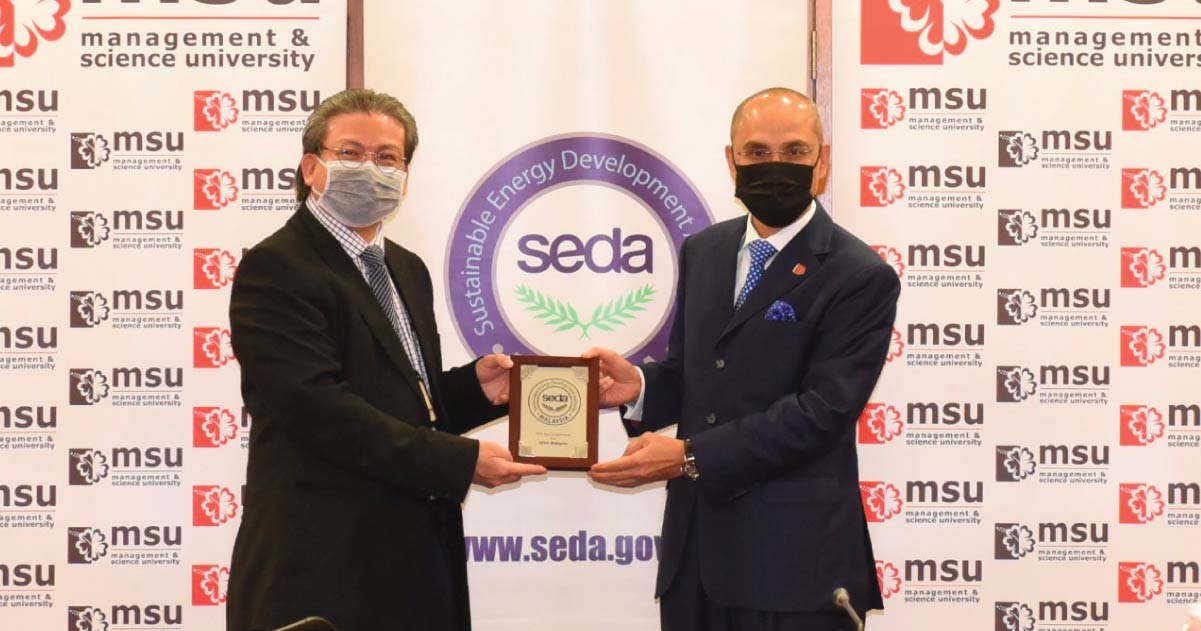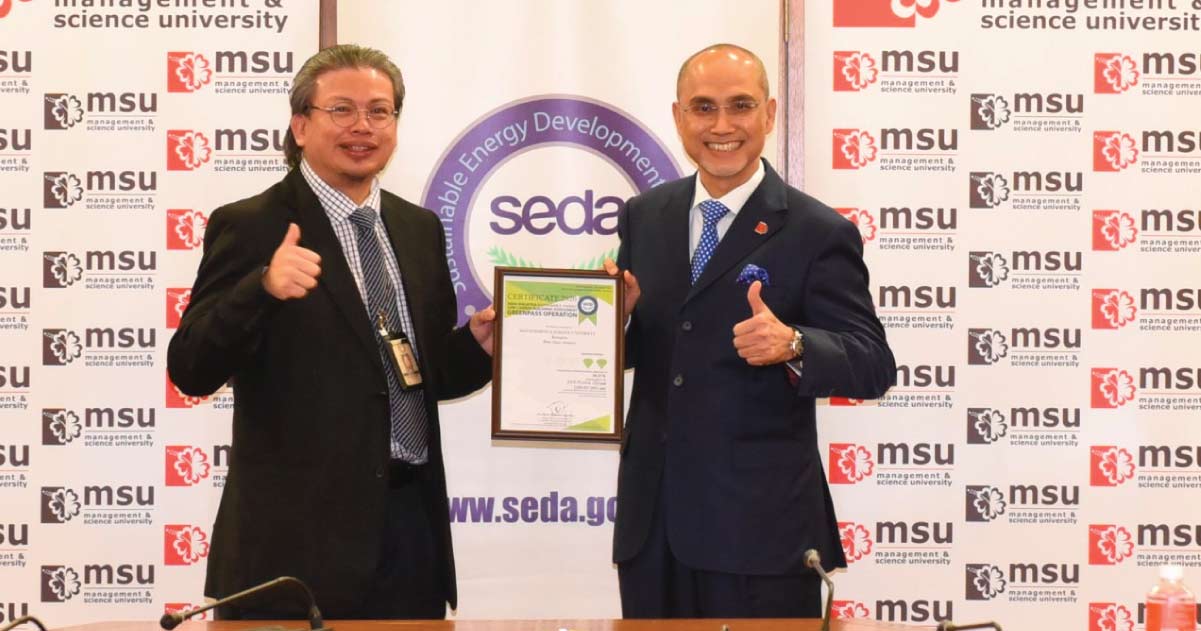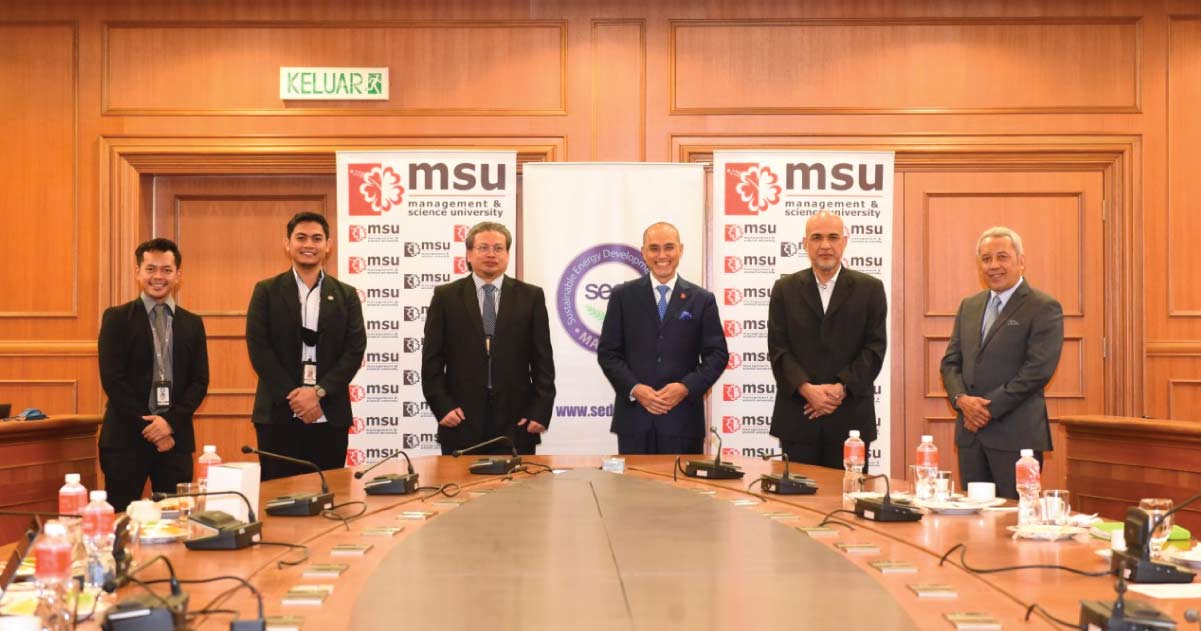

Buildings contribute 80-90 percent of the world’s carbon emission; they thus represent the biggest opportunities for climate-change mitigation through carbon reduction. Universities, as owners of buildings that remain theirs for years to come, have a special responsibility to arrest climate change through sustainable operation. Management and Science University (MSU) achieves a Diamond-2 rating in the SEDA Malaysia Sustainable Energy Low Carbon Building Assessment 2020.
Recording 24.21 percent less emission against baseline measurements in 2019 – an annual saving of 5,646,661 kWh or 3,918.78 tonnes carbon dioxide in 2020 – MSU is well on its way to supporting the governmental target of 40-45 percent less CO2 in 2030.
Presenting MSU President Professor Tan Sri Dato’ Wira Dr Mohd Shukri Ab Yajid with the University’s first green certification was SEDA Acting Chief Strategic Officer TS Steve Anthony Lojuntin.

Whilst the Green Pass illustrates what can be achieved with proactive goals in place for green buildings and the environment, MSU’s green commitment remains to enhance teaching, learning, and research experiences on campus with zero-cost sustainable strategies that reduce use of energy and water.
Living up to the green standard takes more than a show certificate hanging on the wall. Ongoing leadership, driven by the United Nations Sustainable Development Goals (UNSDGs) and a commitment to raising green-building practices, model how organizations may address the changing landscape of sustainability focused on health and wellbeing.
The institutional approach aids effectiveness beyond the millennial wow factor of eco-activism. Outreach to both students and staff ensures a culture that embraces sustainability; one where interdisciplinary actions are taken across multidisciplinary areas.
Target impacts include reverse contribution to global climate change, enhancement of individual health and community wellbeing; restoration, enhancement, and protection of water resources, biodiversity, and the natural ecosystem; promotion of sustainable and regenerative cycling of material resources; as well as development of a greener economy that enhances social equality and life quality while protecting environmental justice.

With the Green Pass, MSU emerged the first private institution of higher education in Malaysia to receive the Sustainable Energy Development Authority (SEDA) Diamond-2 rating.
Management and Science University (MSU) was ranked Top 10 in Malaysia on the Times Higher Education (THE) Impact Rankings 2020; placing World Top 201+ in four UNSDGs and World Top 301+ in three.
Buildings contribute 80-90 percent of the world’s carbon emission; they thus represent the biggest opportunities for climate-change mitigation through carbon reduction. Universities, as owners of buildings that remain theirs for years to come, have a special responsibility to arrest climate change through sustainable operation. Management and Science University (MSU) achieves a Diamond-2 rating in the SEDA Malaysia Sustainable Energy Low Carbon Building Assessment 2020.
Recording 24.21 percent less emission against baseline measurements in 2019 – an annual saving of 5,646,661 kWh or 3,918.78 tonnes carbon dioxide in 2020 – MSU is well on its way to supporting the governmental target of 40-45 percent less CO2 in 2030.
Presenting MSU President Professor Tan Sri Dato’ Wira Dr Mohd Shukri Ab Yajid with the University’s first green certification was SEDA Acting Chief Strategic Officer TS Steve Anthony Lojuntin.

Whilst the Green Pass illustrates what can be achieved with proactive goals in place for green buildings and the environment, MSU’s green commitment remains to enhance teaching, learning, and research experiences on campus with zero-cost sustainable strategies that reduce use of energy and water.
Living up to the green standard takes more than a show certificate hanging on the wall. Ongoing leadership, driven by the United Nations Sustainable Development Goals (UNSDGs) and a commitment to raising green-building practices, model how organizations may address the changing landscape of sustainability focused on health and wellbeing.
The institutional approach aids effectiveness beyond the millennial wow factor of eco-activism. Outreach to both students and staff ensures a culture that embraces sustainability; one where interdisciplinary actions are taken across multidisciplinary areas.
Target impacts include reverse contribution to global climate change, enhancement of individual health and community wellbeing; restoration, enhancement, and protection of water resources, biodiversity, and the natural ecosystem; promotion of sustainable and regenerative cycling of material resources; as well as development of a greener economy that enhances social equality and life quality while protecting environmental justice.

With the Green Pass, MSU emerged the first private institution of higher education in Malaysia to receive the Sustainable Energy Development Authority (SEDA) Diamond-2 rating.
Management and Science University (MSU) was ranked Top 10 in Malaysia on the Times Higher Education (THE) Impact Rankings 2020; placing World Top 201+ in four UNSDGs and World Top 301+ in three.